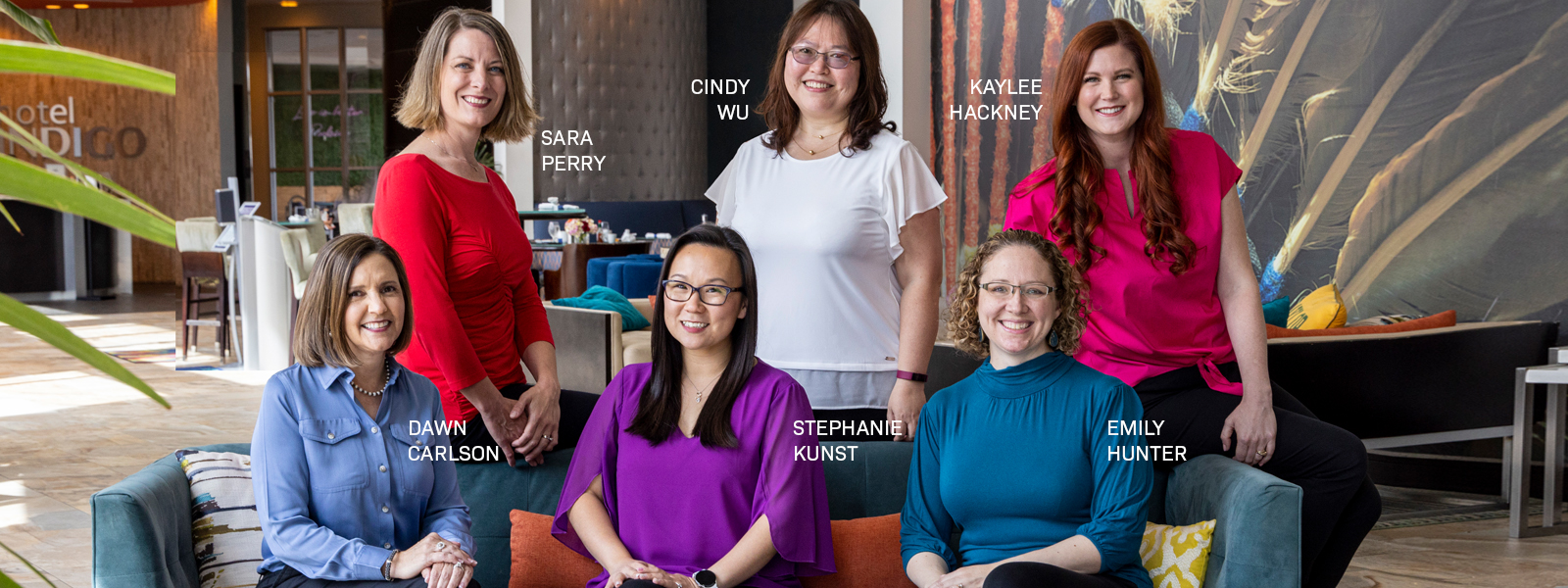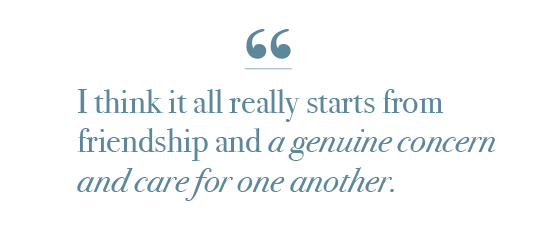Kinship, Collaboration and a Cup of Coffee
Management faculty reap benefits of friendly mentor relationships
By Emily Iazzetti
Walking through the Management suite of the Paul L. Foster Campus for Business and Innovation, many office doors are left open and people often stop to chat in the hallway.
“I rarely close my door in the office because if someone needs me, I want them to feel like, ‘Okay, I can ask her a question,'” Stephanie Kunst, assistant professor of Management, said.
The open doors are just one indicator of the culture of collaboration that is thriving in the department. Faculty members, including many of the women, have built an informal mentoring network that supports their time with students in the classroom, gives advice on family issues and especially helps advance their research work.
Mentoring
The Department of Management assigns a formal mentor to tenure track faculty. That relationship is beneficial, but faculty members quickly realize the added benefits of developing informal mentor relationships.
“When I was going through tenure track, I sought out multiple mentors, male and female,” Emily Hunter, professor of Management, said. “I felt like there was an open door for conversations, so I would seek out multiple perspectives because everyone was so willing and encouraging.”
Dawn Carlson, professor of Management, has been with the department long enough to have served as a formal mentor to faculty members, such as Hunter, who are now in leadership roles and mentoring newer faculty. Carlson said she knows how stressful the tenure track is and she has been intentional about scheduling casual coffee dates with newer faculty to give them an opportunity to talk about what they are struggling with.
“That is the beauty of it,” Carlson said. “It can go anywhere from, ‘How to get your baby to sleep,’ to, ‘How to do an IRB application for your research.’ It really spans the gamut.”
There is joy in being at a place in her career where she can help others, and also getting to know newer members of the department on a more personal level, Carlson said. The relationships between women can blur the boundaries between friendship and mentorship, but rely on a foundation of professional advice and support.
“It is not just about the networking for the professional research, but it is also about the relationships that are built, the foundation of the professional research connections.” Kunst said. “I think it all really starts from friendship and a genuine concern and care for one another.”
Gathering
Many of the professors give credit for the current emphasis on mentoring to Hunter, who became chair of the department in August 2020. They see how she has been growing that culture by focusing on encouragement and collaboration.
“The culture has always been there, but right now we are more intentional about keeping it. We are more explicit about it. Emily, especially after she became chair, is very intentional about bringing people together,” Cindy Wu, professor of Management and associate dean of Diversity and Inclusion, said.
For Hunter that includes sending an email reminder each week about “Management Mondays,” when the professors eat lunch together at the East Village Dining Commons. This standing appointment was never meant to be an obligation to faculty members, but rather an opportunity to get together and have more casual conversations.
“It was over those lunch conversations that I got a sense of what my colleagues are into, what their interests are, what their research might be,” Kunst said.
This tradition started before the pandemic, but has been something the department wanted to incorporate again as people felt comfortable. Sara Perry, associate professor of Management, researches remote work and hybrid-work arrangements, and said that the weekly ritual is an example of what can be lost as people get used to working alone at home.
“We have to fight to protect our culture. You really have to be intentional to do those things,” Perry said. “I am glad that there are multiple people in our department who push and remind and continue to do it.”
Hunter also invites the department to gather informally at least once a semester to celebrate each other and puts a lot of emphasis on an out-of-town retreat at the beginning of each school year.
“It is another way for us to learn about what each other is working on and focusing on, and how their heart for Jesus is present in that work,” Hunter said. “It is a really good time to come together.”
Believing
Perhaps it is not that surprising that the Department of Management has created an environment full of best practices for workplace success. After all, the mission of the department is to promote human flourishing. They have seen the data for the benefits of having a good work-life balance and healthy relationships at work.
“These things are ever present in our minds because we are constantly reading it and studying it and trying to contribute to that conversation,” Hunter said. “I think that probably does direct the way that we teach, the way that we interact with each other. It is just more on our minds.”
That means overall, the faculty are more inclined to celebrate each other, rather than see each other as direct competition. Perry said it is important to remember that it is not a “fixed pie” where one person’s success could keep someone else from also finding success.
“I think everyone is very successful and productive, and they want to see everyone else be successful and productive. It is very much an encouraging and uplifting culture,” Perry said.
With a culture that encourages celebrating others, they are able to take pride in the work that is happening across the department, rather than just the work in their own offices. However, it is not just expertise in management that allows their collaboration to thrive; they rely on their faith as an integral part of the department culture.
“I think that is what sets Baylor’s Department of Management apart. Not every management department has a culture like this,” Hunter said. “I think it is the values and our faith-based culture and our interest in lifting each other up to do God’s work that changes the way that we treat one another and how we care for one another.”
Sharing a faith deepens their connections and is an underlying motivation in all of their research and work together. For Kunst, it is just one more benefit of collaborating with the women in her department.
“We have an attitude that reflects the understanding that we are stewards of the gifts and talents that we have been given. They are not to be squandered,” Kunst said. “We also recognize that any of our success is really for the glory of the Lord.”
Collaborating
As part of this informal mentoring network, more professors in the Department of Management are collaborating on research than ever before, Hunter said. Inspiration for those projects has come anywhere from text messages on a Saturday morning to run-ins in the office break room. For many of the professors, the topics are extremely personal.
“After I had the second miscarriage, I could not suppress the emotions and the immense grief. I asked myself, ‘What can I do with this loss?'” Wu said.
Wu decided to stop by the office of Kaylee Hackney, assistant professor of Management, who studies pregnancy in the workplace. Wu shared her experience and proposed starting qualitative research together about miscarriage. Wu said it was an emotional conversation for both women.
“She teared up and then she stood up and gave me the biggest hug. And then we started a project from there,” Wu said.
That research has resulted in a book chapter entitled “Invisible Grief: An Examination of Miscarriage in the Workplace.” The pair is continuing their work on pregnancy loss in the workplace, including 40 interviews with women who have had a loss in the last year.
“I think it has allowed me to get to know Cindy on a deeper level. Instead of just the professional conversations, we share something intimate by having that loss and wanting to work on this project together,” Hackney said.
Half of the Department of Management faculty are currently women. The faculty certainly collaborates across gender lines, but having so many women at the table allows for different types of conversations to happen.
“Because there are so many women in our department, it is easy to find a woman to build that mentoring relationship with,” Kunst said. “The culture of our department encourages the fostering of even informal moments, where you are comfortable enough no matter what your position or formal title to knock on someone’s door and say, ‘I have a question.'”
The collaborative culture and mentoring network have not happened accidentally, but have been cultivated intentionally to encourage the faculty to flourish, together.
“We work with so many strong women who balance so many roles—mother-wife-professional-professor-business person—and we do it all as people of faith,” Perry said. “I just admire every one of them so much.”
Baylor Business Review, Fall 2022




